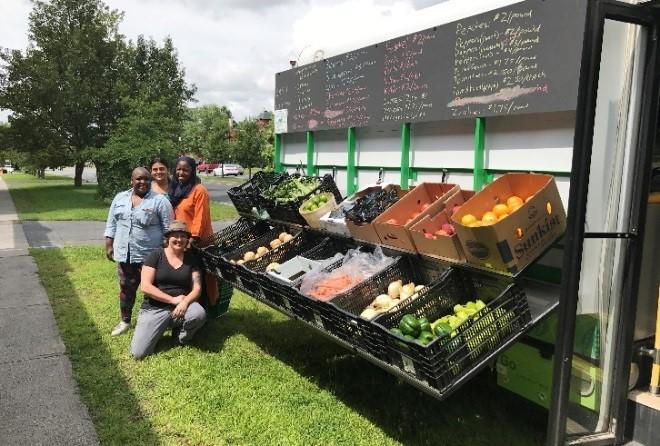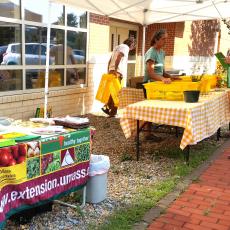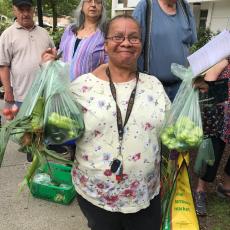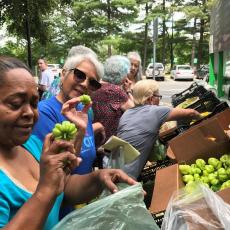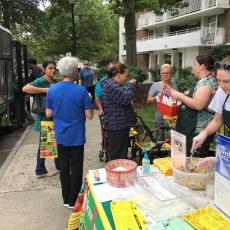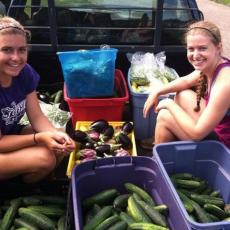In Our Spotlight
Today’s Mobile Markets: Fresh Food with A Helping of Education
Eating healthier meals is almost impossible when you have no easy access to fresh, nutritious food. In many neighborhoods of Massachusetts, finding any fresh food was hard until the idea of mobile markets came to life. And now, UMass Extension nutritionists in urban areas across the Commonwealth have teamed up with other organizations to connect mobile market customers to recipes and education. Mobile fresh food markets have launched in Brockton, Worcester, Springfield and Lowell, among other cities. They have become even more effective since the Massachusetts’ Healthy Incentives Program (HIP) began last July. This new statewide program provides a financial incentive to purchase fresh produce at farmers markets, roadside stands, CSA’s and (drum-roll please) mobile markets for those receiving SNAP benefits (formerly known as Food Stamps). Essentially, this makes fresh food free for the participants.
Mobile Market Makeover

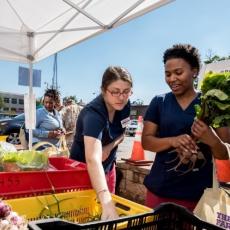 Those of a certain age will remember the vegetable, bread or milk trucks that stopped on streets throughout suburban America in the 1940’s and 1950’s. One could buy fresh carrots, lettuce, sweet-smelling rolls or milk right off the truck. Now residents who live in some low-income neighborhoods have reason to cheer as “Mobile Market” food trucks drive into their communities on a predictable schedule and offer fresh food there for the picking. The result is that people who live in so-called “food desert” neighborhoods are on the lookout for the mobile vegetable truck. In Springfield, for example, low-income residents can now stop by one of twelve “Go Fresh” mobile markets, a steady increase that has grown in response to demand.
Those of a certain age will remember the vegetable, bread or milk trucks that stopped on streets throughout suburban America in the 1940’s and 1950’s. One could buy fresh carrots, lettuce, sweet-smelling rolls or milk right off the truck. Now residents who live in some low-income neighborhoods have reason to cheer as “Mobile Market” food trucks drive into their communities on a predictable schedule and offer fresh food there for the picking. The result is that people who live in so-called “food desert” neighborhoods are on the lookout for the mobile vegetable truck. In Springfield, for example, low-income residents can now stop by one of twelve “Go Fresh” mobile markets, a steady increase that has grown in response to demand.
What Happens When a College Farm, a Large University and a Health Organization Team Up?
The Farm at Stonehill: A Unique Response to Food Access
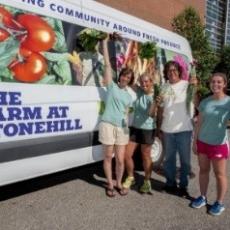 The Farm at Stonehill College in Easton was established in 2011 as an active social justice farm, producing food for pantries and shelters. In 2015, Bridget Meigs, farm manager, identified a problem to be solved: how to provide easy access to fresh foods for people living in Brockton’s food deserts and inspire them to continue coming back for more. The solution she and her team created three years ago is a mobile market that delivers fresh food from Stonehill’s farm directly to those in need. Not only are vegetables available well below market cost, but her farm team takes the opportunity to share information about complementary efforts to increase health and wellness. Upon the arrival of the food van, a small crowd of residents start to form – sometimes they help carry vegetables to tables, illustrating the wide community support that has evolved around fresh produce. Meigs says she feels lucky to be able to work with BHNC staff to offer affordable, organic, locally-grown vegetables to a population that might otherwise find it difficult to access this kind of harvest.
The Farm at Stonehill College in Easton was established in 2011 as an active social justice farm, producing food for pantries and shelters. In 2015, Bridget Meigs, farm manager, identified a problem to be solved: how to provide easy access to fresh foods for people living in Brockton’s food deserts and inspire them to continue coming back for more. The solution she and her team created three years ago is a mobile market that delivers fresh food from Stonehill’s farm directly to those in need. Not only are vegetables available well below market cost, but her farm team takes the opportunity to share information about complementary efforts to increase health and wellness. Upon the arrival of the food van, a small crowd of residents start to form – sometimes they help carry vegetables to tables, illustrating the wide community support that has evolved around fresh produce. Meigs says she feels lucky to be able to work with BHNC staff to offer affordable, organic, locally-grown vegetables to a population that might otherwise find it difficult to access this kind of harvest.
The Stonehill mobile market is set up at two locations: a neighborhood health center and a low-income housing complex. Meigs has succeeded by partnering with other organizations to offer cooking demonstrations, recipes, and nutritional information to visitors. The UMass Extension Nutrition Education Program and Harvard Pilgrim Health Care Foundation are among her key collaborators.
UMass Extension Nutrition Education Program Provides Hands-on Education
Raynham
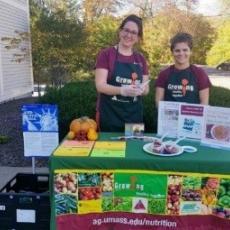 When Meigs invited UMass Extension nutritionists based in nearby Raynham to participate in Brockton’s mobile markets, Andrea Gulezian, project supervisor, jumped at the chance. Over three years, their hands-on involvement has already made a big difference. The mobile makeover matches locally-grown vegetables, easy recipes and sound nutritional education, and resonates soundly with those it serves.
When Meigs invited UMass Extension nutritionists based in nearby Raynham to participate in Brockton’s mobile markets, Andrea Gulezian, project supervisor, jumped at the chance. Over three years, their hands-on involvement has already made a big difference. The mobile makeover matches locally-grown vegetables, easy recipes and sound nutritional education, and resonates soundly with those it serves.
Gulezian says, “The Mobile Market is a great way to bring fresh produce to the consumer right where they live or shop. We found that by working one-on-one at this venue and developing trustworthy relationships with neighbors, our nutrition educators have steadily developed a culture of healthier eating within this population.”
When the mobile market sets up outside a health center, residents who receive vouchers from health care professionals, (essentially, a prescription for wellness) walk right up to the mobile market. On a recent fall day, nutritionists shared butternut squash soup, prepared with squash, carrots, and garlic right off the truck. UMass extension nutrition educator, Stephanie DeLaBruere said most people were happy to learn how to use the vegetables and, after witnessing how easy the soup was to make, they were willing to try it at home. One participant told her, “I know the food is healthy, but I don’t mind,” a spontaneous indication of success, and an effective way to introduce vegetables to a new audience.
Research has shown that living closer to retail outlets selling healthy food is among the factors associated with better eating habits that in turn result in decreased risk for obesity and diet-related diseases. Boosting health outcomes alone is good reason to make sure easy access to good food and nutrition education occur hand-in-hand.
Regarding Extension’s involvement, Meigs says, “UMass Extension provides information about healthy ways to consume vegetables in a very kind, open and inviting way.” Across the state, UMass provides education at mobile markets in myriad settings including a mosque, a public library, a YMCA, a health care center, a senior center and several housing developments.
Harvard Pilgrim Health Care Foundation Makes Health Connections Clear
A resident who lives in a food desert might visit their local convenience store to purchase a meal that consists of a couple of slim jims, chips, soda and a candy bar. A non-nutritious meal that comes with a side order of health issues and disease. Harvard Pilgrim Health Care Foundation (HPCHF) aims to change that situation. According to Michael Devlin, HPCHF Director of Grants and Initiatives, their goal is straightforward: increase access to fresh local foods for low and middle-income families through their Healthy Food Fund. This is why they have thrown their support behind mobile markets in Worcester and Lowell.
Devlin remarks, “Providing access to fresh food is one of the key ways to continue to drive down the cost of health care in this country, which has risen from 5 percent of national income in 1960 to 16 percent today. Four of the top 10 killers in America right now are chronic diseases linked to diet: heart disease, stroke, Type 2 diabetes and cancer.”
This is a story of success: the success of mobile markets at getting fresh food to places where you could not find it before, the success of the Healthy Incentives Program in helping low-income residents afford the food, and the success of accompanying the food with some friendly and practical education from nutrition professionals. It turns out to be a story with many contributing characters. The success of these efforts speaks for itself: they are making a real difference in peoples’ lives. It is no accident that Extension is part of this story. With a nod to the historic role of extension at universities, Lindiwe Sibeko, assistant extension professor of nutrition, said, “Improving people’s lives is a process. Understanding our role in the process is part of the culture of Extension.”
